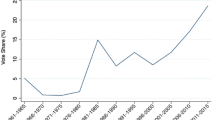Abstract
Discussions of whether American primacy will continue focus unduly on specific power differences between the United States and its Asian rivals. Appraisals should also consider institutional capacities. Western regimes have large advantages rooted in cultural differences. Individualism generates stronger economies and governments than the more collective worldviews of the non-West. America will continue to lead mainly because of its far greater willingness to take responsibility for world problems.
Similar content being viewed by others
Notes
Christopher Layne, “Impotent Power? Re-examining the Nature of America’s Hegemonic Power,” The National Interest, no. 85 (Sept./Oct. 2006): 41–7; Robert A. Pape, “Empire Falls,” The National Interest, no. 99 (January/February 2009): 21–34; Arvind Subramanian, “The Inevitable Superpower: Why China’s Dominance Is a Sure Thing,” Foreign Affairs 90, no. 5 (September/October 2011): 66–78.Christopher Layne, “Impotent Power? Re-examining the Nature of America’s Hegemonic Power,” The National Interest, no. 85 (Sept./Oct. 2006): 41–7; Robert A. Pape, “Empire Falls,” The National Interest, no. 99 (January/February 2009): 21–34; Arvind Subramanian, “The Inevitable Superpower: Why China’s Dominance Is a Sure Thing,” Foreign Affairs 90, no. 5 (September/October 2011): 66–78.
Robert J. Lieber, Power and Willpower in the American Future: Why the United States is Not Destined to Decline (New York: Cambridge University Press, 2012); Fareed Zakaria, The Post-American World, Release 2.0 (New York: Norton, 2012); Joseph S. Nye, Jr., The Future of Power (New York: Public Affairs, 2011); Joseph S. Nye, Jr., Is the American Century Over? (Cambridge, England: Polity Press, 2015).
Francis Fukuyama, The End of History and the Last Man (New York: Free Press, 1992).
Derek Bok, The State of the Nation: Government and the Quest for a Better Society (Cambridge, MA: Harvard University Press, 1996), pp. 336, 89–91, 367–72.
Shankar Singham and Donna Hrinak, “Poverty and Globalization,” The National Interest, no. 82 (Winter 2005/06): 117–22.
Francis Fukuyama, The Origins of Political Order: From Prehuman Times to the French Revolution ( New York: Farrar, Straus and Giroux, 2011), parts 3–4.
Francis Fukuyama, State-Building: Governance and World Order in the 21st Century (Ithaca: Cornell University Press, 2004), chap. 1; idem, Political Order and Political Decay: From the Industrial Revolution to the Globalization of Democracy (New York: Farrar, Straus and Giroux, 2014), chaps. 14–26.
Lawrence M. Mead, “Why Anglos Lead,” The National Interest, no. 82 (Winter 2005/06): 124–31; Thomas Ertman, Birth of the Leviathan: Building States and Regimes in Medieval and Early Modern Europe (Cambridge, England: Cambridge University Press, 1997).
World Bank governance indicators for 2013.
Samuel P. Huntington, “Political Development and Political Decay,” World Politics 17, no. 3 (April 1965): 386–430; Fukuyama, Political Order and Political Decay.
Thomas Carothers, “The End of the Transition Paradigm,” Journal of Democracy 13, no. 1 (January 2002): 5–21; idem, “The Rule of Law Revival,” Foreign Affairs 77, no. 2 (March-April 1998): 95–106.
The following summarizes several authors, particularly Geert Hofstede, Culture’s Consequences: International Differences in Work-Related Values: (Newbury Park, CA: Sage, 1980); Richard E. Nisbett, The Geography of Thought: How Asians and Westerners Think Differently . . . and Why (New York: Free Press, 2003), and F.S.C. Northrop, The Meeting of East and West: An Inquiry Concerning World Understanding (New York: Macmillan, 1946). Remarkably, Hegel in The Philosophy of History, composed in the 1820s, contrasts Western and Asian cultures in very similar terms.
Samuel P. Huntington, Who Are We? The Challenges to America’s National Identity (New York: Simon & Schuster, 2004), chap. 4; John King Fairbank and Merle Goldman, China: A New History, 2nd enlarged ed. (Cambridge, MA: Harvard University Press, 2006).
Ronald Inglehart and Wayne E. Baker, “Modernization, Cultural Change, and the Persistence of Traditional Values,” American Sociological Review 65, no. 1 (February 2000): 19–51; Ronald Inglehart and Christian Welzel, “How Development Leads to Democracy,” Foreign Affairs 88, no. 2 (March-April 2009): 33–48.
Samuel P. Huntington, The Clash of Civilizations and the Remaking of World Order (New York: Simon & Schuster, 1996); Adda B. Bozeman, Politics and Culture in International History: From the Ancient Near East to the Opening of the Modern Age, 2nd ed. (New Brunswick, NJ: Transaction, 1994).
Northrop, Meeting of East and West, pp. 344–5, 425.
Lawrence E. Harrison and Samuel P. Huntington, eds., Culture Matters: How Values Shape Human Progress (New York: Basic Books, 2000)..
In The Peloponnesian Wars, Thucydides does contrast the behavior of democratic and oligarchic states. But aside from brief mentions of Persia, the comparisons are all within Greece, an individualistic culture, rather than between it and the non-West.
John J. Mearsheimer, The Tragedy of Great Power Politics (New York: Norton, 2001).
Paul M. Kennedy, The Rise and Fall of the Great Powers: Economic Change and Military Conflict from 1500 to 2000 (New York: Random House, 1987).
Martin Jacques, When China Rules the World: The End of the Western World and the Birth of a New Global Order (New York: Penguin, 2009).
G. John Ikenberry, Liberal Leviathan: The Origins, Crisis, and Transformation of the American World Order (Princeton: Princeton University Press, 2012).
Author information
Authors and Affiliations
Corresponding author
Rights and permissions
About this article
Cite this article
Mead, L.M. The Primacy Contest: Why Culture Matters. Soc 52, 527–532 (2015). https://doi.org/10.1007/s12115-015-9943-x
Published:
Issue Date:
DOI: https://doi.org/10.1007/s12115-015-9943-x




